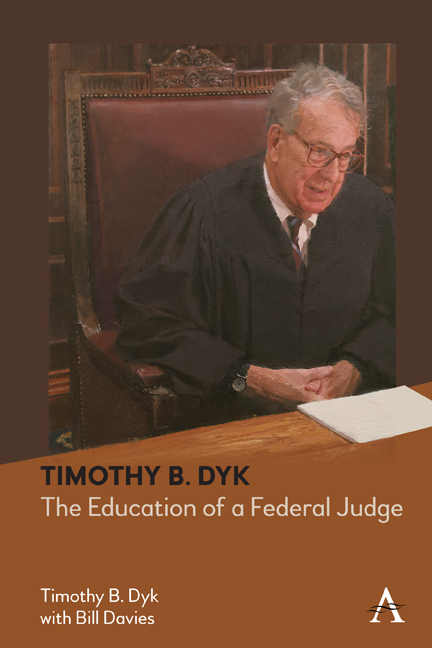Book contents
- Frontmatter
- Dedtication
- Contents
- Foreword
- Acknowledgments
- 1 Introduction
- 2 Family History
- 3 Early Life and Schooling, 1937–61
- 4 Clerking at the Supreme Court, 1961–63
- 5 The Tax Division, 1963–64
- 6 Wilmer Cutler, 1964–90
- 7 Jones Day, 1990–2000
- 8 Reflections on Changes in the Legal Profession
- 9 Becoming a Federal Judge, 1993–2000
- 10 The Confirmation Process, 1998–2000: Selected Diary Entries
- 11 Life as a Federal Judge, 2000–the Present
- 12 Epilogue
- Appendix
- Index
11 - Life as a Federal Judge, 2000–the Present
Published online by Cambridge University Press: 15 September 2022
- Frontmatter
- Dedtication
- Contents
- Foreword
- Acknowledgments
- 1 Introduction
- 2 Family History
- 3 Early Life and Schooling, 1937–61
- 4 Clerking at the Supreme Court, 1961–63
- 5 The Tax Division, 1963–64
- 6 Wilmer Cutler, 1964–90
- 7 Jones Day, 1990–2000
- 8 Reflections on Changes in the Legal Profession
- 9 Becoming a Federal Judge, 1993–2000
- 10 The Confirmation Process, 1998–2000: Selected Diary Entries
- 11 Life as a Federal Judge, 2000–the Present
- 12 Epilogue
- Appendix
- Index
Summary
I left the practice of law in the twentieth century and began as a judge in the twenty-first century. When I was sworn in as a circuit judge on June 9, 2000, I was 63 years old. I was secure financially. My three children had been, or would be, able to go through college without any debt, and the two older ones were employed and self-supporting. Sally, who had had her bout with breast cancer, was then finishing her treatment and on the road to recovery. Because of my age, I had no realistic ambition of doing anything else in government other than sitting on the court. True, I would be eligible for senior status or full retirement in 10 years and could in theory reenter private practice or serve as a mediator or arbitrator. I had seen what that world was like for retired judges in private practice, having spent time working with George Pratt, who retired from the Second Circuit, and Charles Clark, who retired from the Fifth Circuit. That was not for me. I note that four judges on our court left the court for greener pastures that perhaps turned out to be not as green as they thought they would be. Thus, I came to the bench knowing that I would remain for the rest of my professional life—a prospect that I found most congenial.
Like all new judges, I felt a profound sense of privilege—the opportunity to contribute to American jurisprudence and to decide cases fairly and pragmatically within the bounds of precedent. The feeling of responsibility was enhanced by our location overlooking Lafayette Park and the White House.
Any new circuit judge coming from private practice is aware that there are major differences from the world that he or she has just left. There is life tenure (unlike most state appellate courts) and fixed compensation. There is no client to establish the lodestar of a desired outcome. A judge no longer has to be concerned about where the work is coming from and whether there will be work to do.
There is enough time to address the issues properly and, apart from the need to show up on time for oral argument, few deadlines (the lack of deadlines is not as beneficial as one might think; judges sometimes can take years to produce an opinion that should take a couple of months).
- Type
- Chapter
- Information
- Timothy B. DykThe Education of a Federal Judge, pp. 181 - 216Publisher: Anthem PressPrint publication year: 2022



